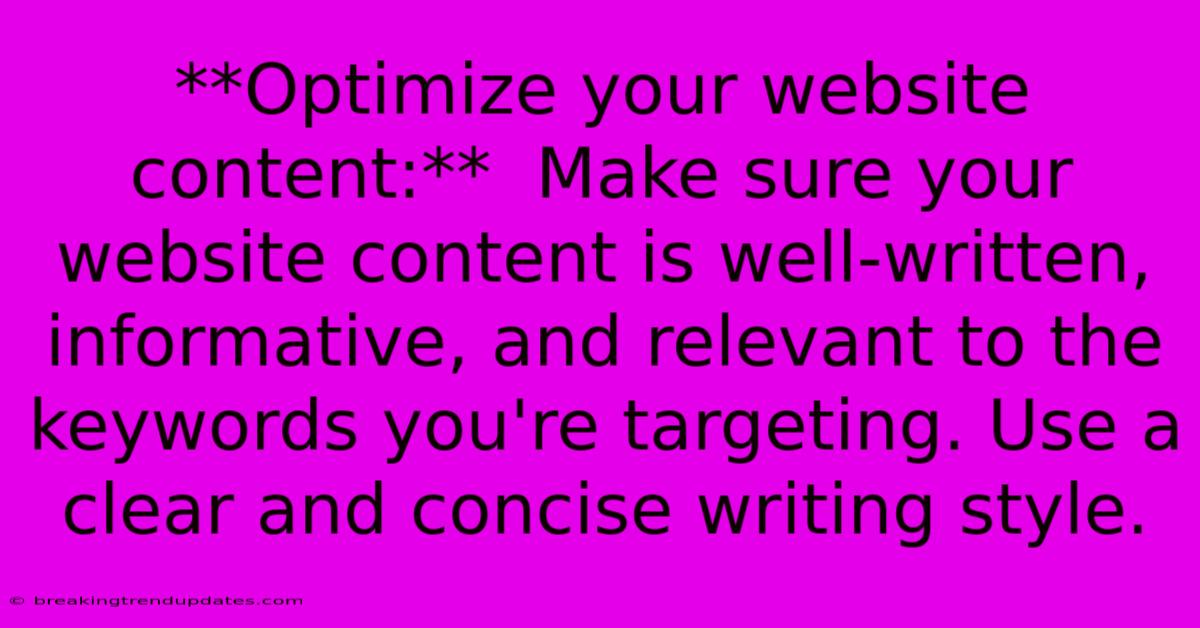**Optimize Your Website Content:** Make Sure Your Website Content Is Well-written, Informative, And Relevant To The Keywords You're Targeting. Use A Clear And Concise Writing Style.

Discover more detailed and exciting information on our website. Click the link below to start your adventure: Visit Best Website breakingtrendupdates.com. Don't miss out!
Table of Contents
Optimize Your Website Content: A Guide to Boosting Your SEO
In the digital age, your website is your online storefront. It's where you showcase your brand, products, and services to the world. But having a website isn't enough. To truly thrive online, you need to optimize your website content to attract visitors, engage them, and ultimately, convert them into customers.
Why is Website Content Optimization Important?
Website content optimization is essential for two key reasons:
- SEO: Well-optimized content helps your website rank higher in search engine results pages (SERPs). This means more people will find your website when searching for relevant keywords, driving organic traffic and boosting brand visibility.
- User Experience: High-quality content provides value to your visitors. It informs them, solves their problems, and ultimately, encourages them to engage with your brand. This leads to increased conversions, loyalty, and positive word-of-mouth marketing.
How to Optimize Your Website Content
Here's a comprehensive guide to optimizing your website content for both search engines and users:
1. Keyword Research: The Foundation of Your Strategy
Before you start writing, you need to understand what your target audience is searching for. This is where keyword research comes in.
- Identify relevant keywords: Use tools like Google Keyword Planner, Ahrefs, or SEMrush to discover keywords related to your industry, products, or services.
- Target long-tail keywords: These are longer, more specific phrases that often have lower competition and higher conversion rates.
- Prioritize your keywords: Focus on the most relevant and high-volume keywords for your website. Don't try to target every keyword under the sun.
2. Write Compelling Content That Answers User Intent
Once you have your keywords, it's time to create content that fulfills your audience's search intent.
- Focus on providing value: Your content should answer questions, solve problems, or entertain your readers.
- Write for your target audience: Use language and tone that resonates with your ideal customer.
- Structure your content effectively: Use clear headings, subheadings, bullet points, and visuals to break up your text and make it easy to read.
3. Optimize for Readability
Search engines favor content that is easy for users to understand and read.
- Keep sentences short and to the point.
- Use strong verbs and active voice.
- Write in a conversational tone.
- Use short paragraphs and white space to enhance readability.
4. Incorporate Keywords Naturally
Now it's time to weave your chosen keywords into your content.
- Don't stuff keywords: Avoid cramming keywords into your content in an unnatural way.
- Use keywords in headings and subheadings: This signals to search engines what your content is about.
- Place keywords in the first paragraph and throughout the content.
- Use keyword variations: Instead of using the same keyword repeatedly, use synonyms and related terms.
5. Utilize Internal and External Linking
Linking is an important factor in SEO.
- Internal linking: Link to relevant pages within your own website to improve navigation and user experience.
- External linking: Link to high-quality external resources to support your claims and provide additional context for your readers.
6. Optimize Your Images and Videos
Visual content plays a crucial role in engagement.
- Use descriptive filenames and alt text for your images. This helps search engines understand the content of your visuals.
- Optimize your videos for search engines. Use keywords in your video titles, descriptions, and tags.
7. Measure Your Results
Once you've implemented these optimization strategies, it's essential to track your progress. Use analytics tools like Google Analytics to monitor:
- Website traffic: Track your organic traffic over time and see how it's affected by your content optimization efforts.
- Keyword rankings: Monitor your website's ranking for your target keywords.
- Bounce rate: This measures how many visitors leave your website after viewing only one page. A high bounce rate could indicate that your content isn't engaging enough.
- Time on site: This metric shows how long visitors stay on your website. Longer dwell times suggest valuable and engaging content.
- Conversions: Track conversions (e.g., sign-ups, sales, form submissions) to see how well your content is driving results.
Conclusion:
Optimizing your website content is an ongoing process, but it's a crucial investment for your online success. By focusing on relevant keywords, creating high-quality content, and consistently analyzing your results, you can significantly improve your website's visibility, engagement, and ultimately, your bottom line.

Thank you for visiting our website wich cover about **Optimize Your Website Content:** Make Sure Your Website Content Is Well-written, Informative, And Relevant To The Keywords You're Targeting. Use A Clear And Concise Writing Style.. We hope the information provided has been useful to you. Feel free to contact us if you have any questions or need further assistance. See you next time and dont miss to bookmark.
Thank you for visiting our website wich cover about **Optimize Your Website Content:** Make Sure Your Website Content Is Well-written, Informative, And Relevant To The Keywords You're Targeting. Use A Clear And Concise Writing Style.. We hope the information provided has been useful to you. Feel free to contact us if you have any questions or need further assistance. See you next time and dont miss to bookmark.
Featured Posts
-
Boogschieten Francs Comtois Behalen Succes
Oct 30, 2024
-
Fussball Spiele In Spanien Nach Unwetter Abgesagt
Oct 30, 2024
-
High Speed Rail Approved Quebec City To Toronto
Oct 30, 2024
-
432 Boogschutters In Belfort 24 Uur In Beelden
Oct 30, 2024
-
Bitcoin Surges Past 73 000 Before Election
Oct 30, 2024
